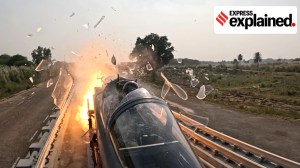Fall of LTTE ‘capital’ not end
Will the fall of the ‘capital’ make the ‘king’ a deadlier force, even more difficult to contain? Even as the Sri Lankan Armed Forces claimed a decisive victory by capturing the northern town of Kilinochchi...

Will the fall of the ‘capital’ make the ‘king’ a deadlier force, even more difficult to contain? Even as the Sri Lankan Armed Forces claimed a decisive victory by capturing the northern town of Kilinochchi, the administrative and political capital of the rebel LTTE, analysts and experts point to the immediate future, one filled with guerrilla and terrorist tactics launched by the rebels.
In fact, this is not the first time Kilinochchi has become the benchmark for proving supremacy on the battlefield by both sides. The town has been under the control of the rebels for the past decade after they recaptured the area from the government forces in 1998.
“The fall of Kilinochchi is a major setback for the LTTE; a loss of prestige more than anything else,” said retired Colonel R Hariharan, who headed the IPKF Intelligence wing in Sri Lanka. “They underestimated their adversaries based on their past experiences. But this is a different army: bigger, modern and more importantly, one which enjoys complete backing from a President who declared the elimination of LTTE as the only solution to the conflict,” added Hariharan.
On the other hand, this fall of their ‘capital’, enables them to return to the flexibility of guerrilla tactics. “The future of LTTE is uncertain, especially because they are not a consultative party but rather a single man-led force. They might now go back to their guerrilla warfare tactics to take on the army,” he said.
V Suryanarayanan, former director, South and Southeast Asian Studies, Madras University, echoed the concerns about a protracted war. “The fall of Kilinochchi is a major setback for the LTTE, which was a cumulative result of some of the past developments like split in the Tiger ranks with the Karuna faction joining forces with the Lankan Army; the international community strangulating the rebels considering them as terrorists; and also because of LTTE’s own decision to boycott the polls which the present President Mahinda Rajapakse won. However, one should remember that this is not the first time they are losing ground,” he said.
“If a military advance is to be successful, it should be backed by political reforms. Unfortunately in Sri Lanka, there has not been any such initiative. This will lead to a long winter of discontent among a section of the population, which will be the reservoir of warm water where the LTTE fish would swim,” warned Suryanarayanan.
The development will have a bearing on the State politics too, said observers, as there are many outfits which are sympathetic to the LTTE’s cause, if not means.
According to CPI State Secretary D Pandian: “The form of the struggle may change, along with the battlegrounds; but this is not the end of the war. For the Tamil civilians who have been at the receiving end of this conflict, the situation will turn worse. They will suffer a lot more.”
- 01
- 02
- 03
- 04
- 05































